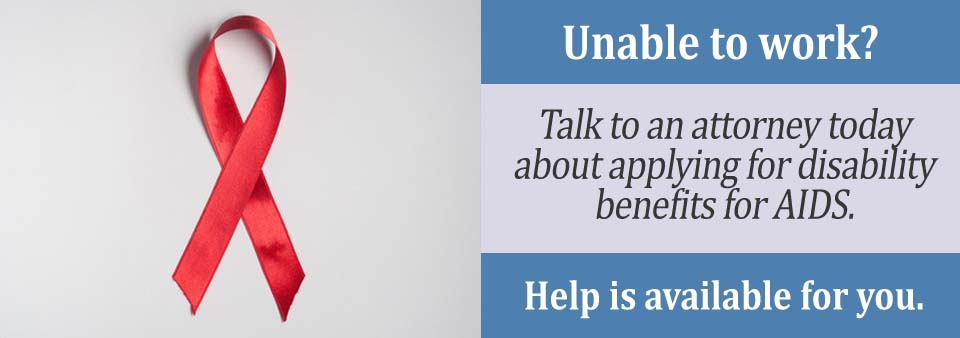From doctor’s visits to worsening pain, living with AIDS can be a daily challenge. However, some people with AIDS feel they have to tackle the resulting physical, mental, and financial strain on their own. With disability benefits, this doesn’t have to be the case.
If you struggle to live your normal life due to your AIDS diagnosis, continue below to see how Social Security disability benefits may be able to support you.
Qualifying in the Blue Book
What is the Blue Book?
When you apply for disability benefits, your goal is to show the Social Security Administration (SSA) that you qualify as “totally and permanently disabled.” This term refers to anyone whose condition is severe enough and permanent enough to warrant continued monthly benefits.
To see if applicants meet this requirement, the SSA compares every case to its corresponding entry in the “Blue Book,” which lists all qualifications necessary to earn benefits for a certain disorder. To see if you will qualify for benefits, we must look at Section 14.00 in the Blue Book: “Immune Disorders – Adult.”
Your Blue Book Listing
While AIDS itself does not have a specific listing, those with the disorder can qualify under subsection 14.11: “Human immunodeficiency virus infection (HIV).” Because HIV can cause a variety of different, severe symptoms, there are multiple ways an applicant can qualify. Aside from medical tests proving the presence of HIV, applicants must also show evidence of one of the following entries:

A. Multicentric Castleman disease affecting multiple groups of lymph nodes or organs containing lymphoid tissue (can be confirmed by a physician or certain medical tests)
B. Primary central nervous system lymphoma (lymphoma that originates in the eye, spinal cord, meninges, or brain; requires an official test for diagnosis)
C. Primary effusion lymphoma (also known as body cavity lymphoma; requires a biopsy or other test to confirm the disorder)
D. Progressive multifocal leukoencephalopathy (a neurological disorder that causes changes in mental function and personality; requires an MRI or spinal fluid test to diagnose)
E. Pulmonary Kaposi sarcoma (a severe lung disorder; can be diagnosed with a biopsy or lung fluid test)
F. Absolute CD4 count of 50 cells/mm3 or less (shows a severe lack of proper immune system protection; can be diagnosed with a blood test)
G. Absolute CD4 count of 200 cells/mm3 or less as well as either BMI less than 18.5 or hemoglobin measurements of less than 8.0 grams per deciliter (can be measured with blood testing and a standard BMI test)
H. Complications of HIV infection requiring at least three 48-hour-or-more hospital visits within a 12-month period (complications can include infection, cancer, inflammatory issues, flu-like symptoms, malnutrition, depression, etc.; requires hospitalization records)
I. Repeated manifestations of HIV infection (other mental/physical limitations, infections, or disorders not listed above) resulting in significant, documented signs of HIV (involuntary weight loss, vomiting, severe fatigue, fever, etc.) as well as either limited functions of daily living, limited social functioning, or limitations in concentrating or completing normal tasks (can be proven with medical documentation, medication lists, hospitalization records, physician notes, RFC tests to measure functioning ability, etc.)
It may be difficult to tell on your own whether or not your AIDS diagnosis meets the requirements of this Blue Book listing. While most people with AIDS are able to qualify here, it is important to speak with your doctor to assess your situation first before applying.
Contacting an Attorney
Between the medical terminology, legal jargon, and paperwork, applying for disability benefits can be overwhelming. To ease the stress of the application process, consider speaking with a disability attorney before you apply.
Their expertise can help simplify the process by making sure everything is properly in order before your application is sent off. In fact, applicants with legal representation are statistically more likely to qualify than those without it.
To give yourself the best chance at receiving benefits, schedule a consultation with a disability attorney today.